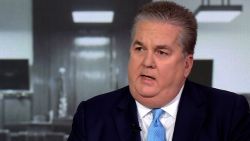Editor’s Note: In this weekly column, “Cross-exam,” Elie Honig, a former federal and state prosecutor and CNN legal analyst, gives his take on the latest legal news and answers questions from readers. Post your questions below. The views expressed in this commentary are his own. View more opinion articles on CNN. Watch Honig answer reader questions on “CNN Newsroom” at 5:40 p.m. ET Sundays. This piece has been update with a question and answer portion.
Attorney General William Barr’s Senate testimony on Wednesday was a master class in obfuscation, backtracking and blame-shifting. This performance would’ve been pathetic coming from an ordinary witness – never mind from the chief law enforcement officer of the United States.
Throughout the day, Barr’s explanations for his most consequential decisions ranged from flatly unpersuasive to downright bizarre. When asked about his determination that not one of the “potentially obstructive actions” detailed by special counsel Robert Mueller constituted obstruction of justice, Barr offered the weak rejoinder that there was no proven underlying crime (debunked below).

Indeed, Barr offered next to nothing to justify his dramatic conclusion that Trump never obstructed justice. When pressed on one of the most flagrant examples of obstruction – Trump’s instruction to then-White House Counsel Don McGahn to have Deputy Attorney General Rod Rosenstein fire Mueller – Barr resorted to a perplexing claim that Trump merely wanted McGahn to discuss Mueller’s conflict of interests. Yet Mueller himself finds in the report that Trump, through McGahn, made “efforts to remove” Mueller, and told McGahn that Mueller “must be removed.” Again: this is the top prosecutor in the United States, not a sneaky defense lawyer out of “Better Call Saul.”
Barr spent much of the day on the run from Mueller’s remarkable March 27 letter, which flatly rebuked Barr for publicly characterizing his report in a way that “did not fully capture the context, nature and substance of this Office’s work and conclusions.” Barr meekly claimed that Mueller’s objection was with the media, which had misshaped public opinion – but that’s simply not what Mueller’s letter says. Yes, Mueller takes issue with media coverage. However, he was also concerned with Barr’s four-page summary – to such an extent that Mueller felt it necessary to put it all on paper the day after the attorney general released it.
And then there was the tragicomedy: Barr openly fawning over Trump yet playing dumb when asked the most elementary questions by Democrats. Barr lamented that Trump was falsely accused – as if Trump was like the Harrison Ford character in “The Fugitive” – and excused Trump’s obstruction efforts because, Barr surmised, he must have felt aggrieved by the investigation. When asked how a political campaign should react if approached by a foreign national offering dirt, Barr didn’t give the only correct and sensible answer – “run and call the FBI” – but instead twisted himself in a pretzel, saying the person should first try to ascertain if the foreigner is an intel agent. And Barr pretended not to understand what basic words such as “receptive” and “suggest” mean, when Democrats had the nerve to use such “technical” terms.
Barr’s performance answered few questions and raised plenty of new ones. He offered nothing of substance to even begin to explain his dramatic “no obstruction” conclusion. He showed little appreciation for the national security threat posed by Russian interference in the 2016 election – and the fact that Mueller concluded that the Trump campaign “expected it would benefit electorally” from Russian hacking – nor much inclination to prevent similar attacks in 2020. And he offered no coherent rejoinder to Mueller’s concern regarding Barr’s apparent efforts to spin the Mueller report before releasing it to the public.
Barr now has bailed out on his scheduled House testimony, which is a genuine embarrassment: the attorney general of the United States is running away from a few minutes of follow-up questioning by congressional staffers.
But this is far from over. In the coming weeks, we will likely hear from Mueller himself. That testimony should shed light on the most relevant issues – Russian election interference and Trump’s potential obstruction – and, in the process, further expose Barr’s politically-driven dissembling.
Andrew, Virginia: One of Barr’s arguments against Trump being guilty of obstruction of justice is his view that obstruction cannot occur without an underlying crime. Could Trump have obstructed justice even without an underlying crime?
When asked during Senate testimony about his determination that Trump had not obstructed justice, Barr’s first response was that there was no proven underlying crime – in this case, no proven crime of conspiring with the Russians. Previously, in his four-page letter summarizing Mueller’s findings, Barr noted that “while not determinative, the absence of such (conspiracy) evidence bears upon the President’s intent with respect to obstruction.”
Barr’s testimony was misleading on this count. A prosecutor might choose to give some weight to the absence of an underlying offense, but the law is clear that a person can obstruct justice even in the absence of a separately charged crime. Mueller correctly states in his report that “the obstruction statutes do not require proof of such a(n underlying) crime,” though such absence could be relevant in assessing a subject’s overall motives.
Famous examples of defendants who have been charged with obstruction or similar offenses without an underlying crime include Martha Stewart (who was convicted of obstruction and lying to investigators but no underlying crime), the former chief of staff to Vice President Dick Cheney, Scooter Libby (who was charged and convicted for obstruction, perjury and false statements but later pardoned by Trump), and Roger Stone (whom Mueller has charged with perjury but no separate crime underlying his allegedly false testimony). Even outside the criminal realm, President Bill Clinton was impeached on obstruction and perjury charges without any separate underlying crime.
Mueller lays out several compelling reasons why a person would obstruct justice even in the absence of a definitely provable underlying crime: “Obstruction of justice can be motivated by a desire to protect non-criminal personal interests, to protect against investigations where underlying criminal liability falls into a gray area, or to avoid personal embarrassment.”
If the law was otherwise, then criminals would have every incentive – and reward – to obstruct justice: a person who commits a crime (let’s say murder) and then successfully destroys all evidence of that crime (let’s say by burning the body and destroying the weapon, leaving no evidence to support a murder charge) can be prosecuted neither for the crime itself (murder) nor for obstruction. That is an unjust and dangerous outcome, and it is not how our law works.
Anne, Oregon: What can the House do now that Barr has refused to show up? Will he be arrested?
Assuming that negotiations with the House Judiciary Committee do not result in some sort of agreement, the House has three primary options, all carrying practical drawbacks (described in depth in this New York Times explainer). First, Congress can hold Barr in contempt of Congress, which is primarily symbolic. Second, Congress can refer the matter for a criminal contempt prosecution. Of course, that referral would go to the Justice Department – headed by none other than Barr himself. Don’t count on the Justice Department taking action there. Third, Congress can go to court seeking an order compelling Barr to testify, punishable by imprisonment if defied. That litigation likely would take months, or years, to wind through the federal courts – though there is a rarely-invoked mechanism to seek direct review in the Supreme Court in cases of paramount public interest and time sensitivity.
There’s a bigger picture here, of course. The White House has stonewalled various congressional requests and subpoenas, defying the inherent oversight authority of the legislative branch. Eventually, one of these cases will go to the courts, where we will see a civics course in action: Constitutional showdown between two branches (executive and legislative) decided by the third (judicial).
I’d expect Congress to prevail in court, depending on the specific facts of the dispute. Congress has broad fundamental authority to conduct oversight, and a court likely would intervene and limit only excessive or abusive exercises of that authority. The administration would be wise to pick its battles. A blanket policy of “we will defy every request across the board” won’t play well in courts.
Paula, Massachusetts: Can Barr be removed through impeachment?
Legally, yes – but realistically, it’s exceedingly unlikely.
While impeachment is most commonly associated with Presidents, the House has impeached other federal officials including Senators, Representatives, judges and a Secretary of War. No attorney general has been impeached, but it is clear from the text of the Constitution and history that an attorney general is subject to impeachment.
While the law permits it, don’t hold your breath. I believe Barr has damaged his own credibility and independence, but it is a stretch to argue that he has committed “high crimes and misdemeanors.” And the politics – including the fact that Republicans control the Senate, which can convict on impeachment only with a two-thirds vote – make it exceedingly unlikely that House Democrats will seek to impeach Barr.
Lynn, Georgia: Why would Mueller spend nearly two years investigating without providing clear and conclusive statements of his findings?
In his testimony, Barr pointedly criticized Mueller for failing to make a prosecute-or-don’t-prosecute decision on obstruction. But as Mueller states in the report, Justice Department policy against indicting a sitting president put him in an awkward position.
On one hand, Mueller failed to make a “prosecution or declination decision” on obstruction, as required by the Special Counsel regulations (and Mueller did make such a declination decision with respect to conspiracy).
Yet Mueller explains that even if he found sufficient evidence to justify criminal charges against Trump, “Fairness concerns counseled against potentially reaching that judgment when no charges can be brought” because an accused individual cannot seek to clear his name through a criminal trial. (Mueller leaves us with a sentence that sounds like it was written by Yoda: “if we had confidence after a thorough investigation of the facts that the President clearly did not commit obstruction of justice, we would so state. Based on the facts and the applicable legal standards, however, we are unable to reach that judgment.” Meaning, it seems: I’m not saying Trump did not obstruct justice.
Former federal prosecutor and CNN Legal Analyst Shanlon Wu offers a smart take here, arguing that Mueller did not want to place himself in the middle of a political firestorm by announcing the President had committed a crime but would not be indicted. Ultimately, there is only one way to know for sure why Mueller declined to decide: Mueller’s own testimony, which may happen soon.
Three questions to watch next week?
1) Will the House Judiciary Committee hold Barr in contempt, and will they then go to court to try to force him to testify?
2) Will the White House seek to block Mueller and McGahn from testifying in the House?
3) Will the House request testimony from other players relevant to Mueller’s findings, including Rod Rosenstein, Corey Lewandowski and others?

























